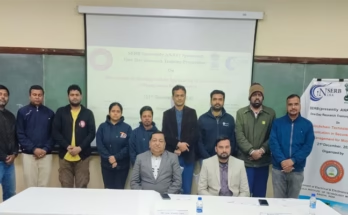 Recently, two significant news stories related to teacher education have made headlines. First, 337 private B. Ed. Colleges in Bihar, including self-financed institutions, have been found non-compliant with NCTE regulations for the four-year integrated B.Ed. course. There is a likelihood of their accreditation being revoked for the upcoming academic session. Second, in Jharkhand, B.Ed teachers from government, universities and 22 constituent colleges held a one-day protest in front of the Raj Bhavan on August 31, demanding regularization, adjustment, and full pay. Both of these reports highlight the current situation, challenges, and the need for substantial governmental intervention in teacher education in Jharkhand and Bihar.
Recently, two significant news stories related to teacher education have made headlines. First, 337 private B. Ed. Colleges in Bihar, including self-financed institutions, have been found non-compliant with NCTE regulations for the four-year integrated B.Ed. course. There is a likelihood of their accreditation being revoked for the upcoming academic session. Second, in Jharkhand, B.Ed teachers from government, universities and 22 constituent colleges held a one-day protest in front of the Raj Bhavan on August 31, demanding regularization, adjustment, and full pay. Both of these reports highlight the current situation, challenges, and the need for substantial governmental intervention in teacher education in Jharkhand and Bihar.
The National Education Policy- 2020 is in its implementation phase, leading to changes across various educational levels, such as school education, higher education, technical education, and vocational education in different states of the country. According to this policy, teacher education is to be developed as a multidisciplinary and integrated. Under this policy, standalone teacher education institutions must be transformed into integrated, reliable, high-quality institutions. By 2030, only those institutions that meet the standards of academic strength, multidisciplinary approach, and integrated B.Ed. the curriculum will be accredited. The country’s apex body for teacher education, the National Council for Teacher Education (NCTE), is also working rapidly on this.
In this context, while the proper arrangement of physical resources is crucial, the biggest concern is the operation of B.Ed. and M.Ed. courses under self-financed schemes in government universities and constituent colleges. In Jharkhand, M.Ed. courses in three government universities and B.Ed. courses in 22 constituents’ colleges have been run under this self-financed scheme for the past 19 years, requiring students to pay substantial amounts as tuition fees. There is also a shortage of physical resources and teachers and non-teaching staff work on contractual terms with minimal wages. The changes in teacher education anticipated under the National Education Policy- 2020 and the current state of teacher education in Jharkhand raise several pressing questions.
Teacher education associations in Jharkhand are meeting with local representatives to present their demands. A delegation from the Jharkhand State B.Ed.-M.Ed. Professors’ Association recently met with the state’s Higher and Technical Education Minister, Ramdas Soren and submitted their demands. Shri. Soren assured the delegation that education departments would be established in all government universities and affiliated colleges, and efforts would be made to regularize the existing faculty. However, no significant official action has been observed in this regard so far.
For the past 19 years, teachers in government universities and the 22 affiliated colleges in Jharkhand, working on minimal wages, have been providing invaluable service and setting an example of dedication and sacrifice. Many professors who hoped that, the Jharkhand government would incorporate these self-financed B.Ed. and M.Ed. departments into the government system and strengthen the state’s teacher education history have passed away. Meanwhile, some have retired, and others are nearing retirement. Moreover, the threat of these educational institutions shutting down looms larger under the National Education Policy- 2020.
Jharkhand’s teacher education system is at a crucial turning point, and the current government needs to take swift and meaningful action in this regard. Such measures would not only secure the rights of M.Ed. and B.Ed. professors who have been serving in government universities and constituent colleges for nearly two decades but also benefit the state’s youth. If the government regularizes these education departments, it can reduce the high tuition fees currently being charged, making B.Ed. and M.Ed. courses more affordable for Jharkhand’s youth. This would provide more opportunities for students to become teachers and professors.
Ensuring proper physical resources and employing permanent faculty would foster a conducive educational environment, thereby promoting high-quality research on various educational issues. This, in turn, would contribute to the progressive development of the state.
(The Author is Prof. (Dr.) Md. Tanwir Yunus, Educationist, Jharkhand)



